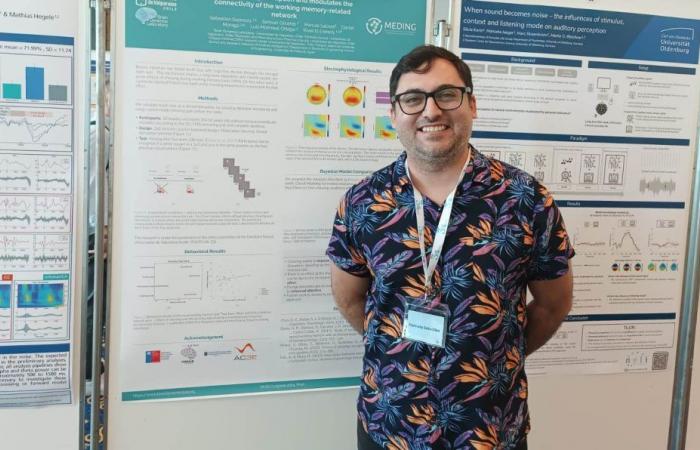
Sebastián Espinoza, an academic at the Faculty of Dentistry of the University of Valparaíso, participated in the Fifth Mobile Brain Imaging (MoBI) Congress in Slovenia, along with 150 international researchers, and made valuable connections with the Berlin University of Technology.
The city of Piran, in Slovenia, was the scene of an important meeting in the field of neuroscience. The Mobile Brain Imaging, MoBI, conference brought together 150 researchers from various disciplines, interested in the latest advances in moving neuroimaging of the brain and body. Among the attendees, the participation of the researcher from the School of Dentistry of the University of Valparaíso and student of the UV Doctorate in Neuroscience program, Sebastián Espinoza, stood out, who leads an innovative study on how chewing influences brain activity.
As Espinoza highlighted, the conference promotes scientific communication, networking and good practices related to MoBI research. By combining methods such as electroencephalogram (EEG) with motion capture and other data streams, MoBI facilitates the investigation of brain activity during active movement and interaction with the environment.
Attending the scientific event, which lasted five days, allowed the academic to learn about new techniques used to study neuroimaging in more natural conditions, overcoming the limitations of the traditional electroencephalogram (EEG).
The UV researcher, who participated in the poster presentation during the event, stated that movements such as chewing can contaminate brain signals when evaluating the activity of the central nervous system with an electroencephalogram. However, he considered the MoBI conference to be an excellent opportunity to discover new solutions to these technical problems.
New collaborations
Along these lines, the scientific meeting was not only a platform to present their research, which was described as very innovative by the attending public, but also an opportunity to establish valuable connections. Espinoza highlighted the diversity of the audience, which included not only neuroscientists, but also architects, artists and musicians, all interested in how their respective disciplines interact with the human brain. “The conversations were incredibly enriching and I established many contacts that could lead to future collaborations,” said Espinoza.
One of the most significant achievements of his participation was the collaboration with the Berlin University of Technology. This alliance materialized thanks to Professor Klaus Gramman, with whom Espinoza had been working virtually and with whom he was finally able to meet in person at the conference. “We made very good contact for future collaborations,” he stated, underlining the importance of presence in science, despite the rise of telematic communications.
“The network with which you return is of a very good level. All the people are on the same page. That helps a lot. It is a community very open to sharing techniques. The network is very, very good. That is what I highlight the most The second thing is the ideas regarding methods that we can apply here. It is not about great technology or great resources, but about using more ingenuity and creativity to solve problems,” he added.
Cutting-edge research
Espinoza also highlighted the impact that this type of events has on the international projection of the University of Valparaíso. “Participating in these conferences positions our university as a cutting-edge research center,” he noted. Furthermore, he emphasized that although other Chilean universities also have EEG laboratories, the UV is advancing in the adoption of more ecological neuroimaging, that is, in more natural and less controlled conditions than those of a traditional laboratory.
Likewise, he shared that the University has a unique opportunity in the field of ecological neuroimaging due to the availability of advanced spaces and equipment, as well as the innovative perspective towards this discipline.
“Compared to other places in the world, we are at the forefront. Many universities are still trapped in the static paradigm, but we are pioneers in moving towards this more ecological line of neuroimaging. This approach allows us to leave the laboratory and perform experiments in real conditions of daily life. This contrasts with traditional experiments, which are very restricted or controlled, almost exclusively in laboratories. Therefore, the new paradigm is more ecological, since it better reflects the true activities of daily life,” he explained.
Regarding his study, Sebastián Espinoza explained that “teeth have a social valuation that includes aesthetic and nutritional functions, but our research reveals a third function: cognitive. This suggests that dental health can also be a strategy to address health problems mental in the country. For example, people who lose teeth show lower performance in cognitive tasks. When they recover their teeth, such as with the use of prostheses, they also recover cognitive function, acting as a protective mechanism against deterioration. Mental health”.
Espinoza highlighted that in Chile there is a program for people over sixty years of age that offers removable prostheses, focusing mainly on aesthetic and nutritional aspects. “However, it has been seen that chewing improves cerebral blood flow, which increases the delivery of nutrients to neurons and brain tissue. In addition, the chewing rhythm better synchronizes brain oscillations, facilitating the activation of cognitive networks,” complement.
The researcher returned to Chile with new techniques and approaches to apply in his research. He is currently working on the data analysis phase of his experiment on chewing and brain activity, and is preparing for a new comparative study with patients who have lost teeth and will receive dentures.
Note: Pamela Simonetti





